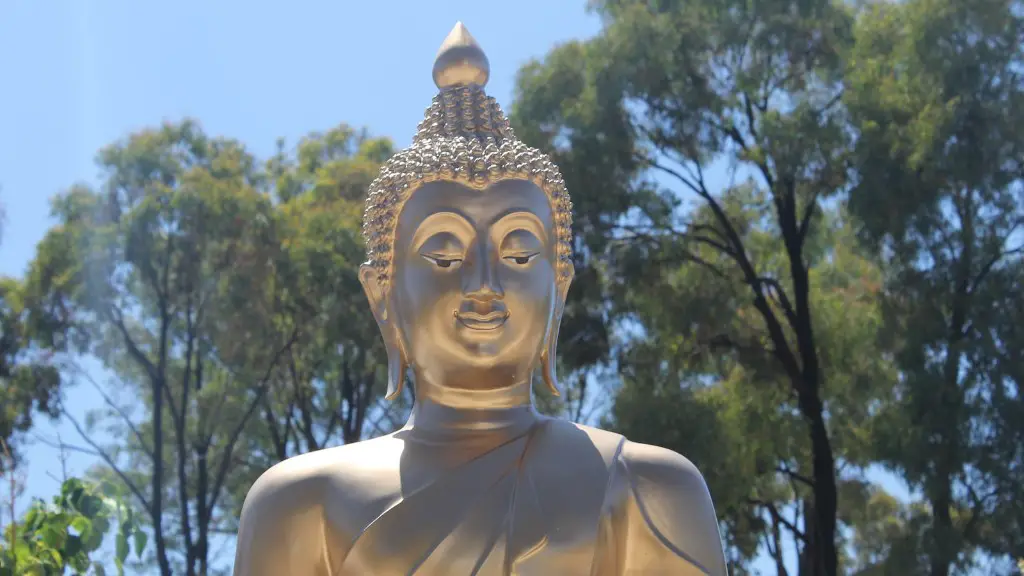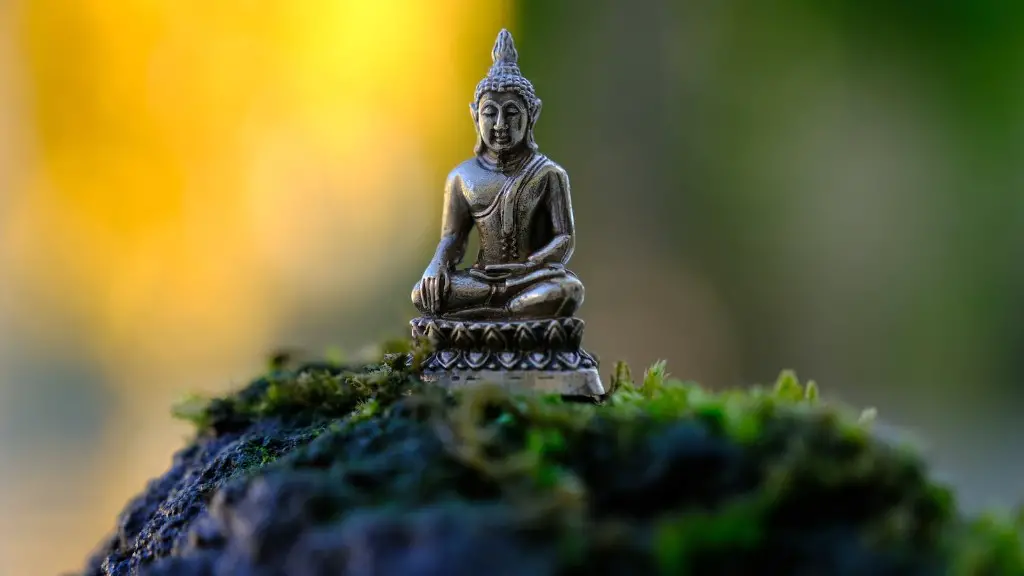Hinduism is a polytheistic religion in which multiple gods and goddesses are worshiped as manifestations of a single, underlying divinity. But is there a god in Hinduism, and if so, what is its role and importance? In this article, we will explore the various aspects of divine worship in Hinduism and explain why the concept of god is so important and central to the faith.
The belief in a single, all-encompassing divinity is at the core of Hindu philosophy and theology. This concept of god exists beyond the limited scope of mortal human understanding, and it is often referred to as “Brahman.” In Hinduism, Brahman is eternal, omnipresent, omniscient, and omnipotent. It is the source of all life, and all living beings, including humans, are part of Brahman.
The exact nature of Brahman is not clearly defined, and it has been ascribed various attributes over the course of history. But at its core, Brahman is viewed as a kind and compassionate being capable of granting liberation and bestowing boons upon its devotees. Some Hindus worship Brahman directly, while others prefer to focus on other aspects of the divine, such as particular gods and goddesses associated with specific powers, such as those associated with fertility, the pursuit of knowledge, and the achievement of excellence.
Some Hindu groups, such as the Vishishtadvaita and Advaita schools, believe Brahman is the only divine being and that all other gods and goddesses are merely manifestations or aspects of this one true god. Other Hindu communities, such as Shaktism and Vaishnavism, worship multiple gods as part of a broader pantheon, in which each deity represents some aspect of Brahman or serves as a mediator between devotees and the ultimate divinity.
Some Hindus revere the divine in abstract concepts, while others prefer to worship specific gods and goddesses. The main deities worshipped include the Trimurti — Brahma, Vishnu and Shiva, who represent the creative, preserving and destructive forces of the universe respectively. Other important figures include the goddesses Lakshmi, Saraswati, Kali and Durga, who represent various aspects of the divine feminine.
The importance of worshipping the divine is central to Hinduism. It is believed that devotees can reach “moksha” or spiritual liberation through consistent practice of devotion and self-reflection. Such devotion can help one to fully realize the truth of Brahman and their own inner divinity. Thus, in Hinduism, the concept of God is not only important but absolutely essential for spiritual progress.
The Role Of Scriptures In Hinduism
The various scriptures of Hinduism provide the faithful with guidance and insight into their relationship with the divine. These scriptures, such as the Vedas, Upanishads, Puranas and Ramayana, contain stories, teachings and other forms of wisdom that help Hindus to connect to the divine. These scriptures also provide instructions on how to worship, meditate, invoke and honor the divine, making them essential tools for spiritual progress.
The Vedas, which are seen as the most sacred of all Hindu texts, are believed to contain the essence of all knowledge. These ancient writings provide guidance on how to live a meaningful and dharmic life in tune with divine will, as well as providing devotees with the tools and information necessary to perform rituals and practice spiritual disciplines.
The Upanishads, which are part of the Vedic literature, provide more detailed information on the nature of Brahman, as well as providing insight into the workings of the universe and the relationship between human beings and the divine. The various Puranas are also important sources of information that help to explain the various legends associated with Hindu gods and goddesses, as well as providing advice and guidance on living a holy and spiritually enlightened life.
Lastly, the Ramayana is the great epic tale of Rama and Sita, two divine incarnations of Vishnu and Lakshmi, who represent the ideal husband and wife. This epic provides an opportunity for devotees to meditate on spiritual themes, such as the importance of dharma and finding liberation through devotion.
Varied Forms Of Hindu Worship
Worship of the divine is an essential component of Hinduism, and devotees practice and celebrate their faith in various ways. Hindus typically worship in private or public ceremonies, and the methods of worship vary from one tradition to another.
Common forms of worship include the singing of mantras, the offering of gifts and prayers to the divine, and the performance of sacred rites, such as puja. These rituals are often carried out in the presence of images or icons of the divine, such as murtis. The nature of these icons may differ depending on the tradition, but they all symbolize the divine and are used as a focus for prayer and ritual.
Devotional practices such as japa and bhakti yoga are also important, as they involve repeating the names of god and meditating on the divine. In addition, temples are an important part of Hindu worship, as they provide space for worship, contemplation and meditation.
The goal of many of these practices is to help the devotee to cultivate a relationship with God and to experience the divine love and peace that is at the heart of Hinduism. Thus, through worship, devotees are able to deepen their knowledge and understanding of the divine and, in turn, deepen their connection to the divine.
Conclusion Of The Divine In Hinduism
In Hinduism, the concept of God is seen as an essential part of faith and spiritual progress. The exact nature of God is open to interpretation, but is generally seen as a single, all-encompassing, benevolent being. Most Hindus prefer to worship multiple gods and goddesses, and other forms of the divine, as part of a broader pantheon.
Worship plays an important role in Hinduism, and there are various forms of devotional practice that are used to draw closer to God and cultivate a relationship with the divine. Regardless of their approach, all Hindu devotees seek to reach moksha, or spiritual liberation, through their devotion and dedication to the divine. Therefore, the presence of god in Hinduism is undeniable.
The Role Of Nature In Hinduism
Nature plays an important role in Hinduism, with the natural world seen as an outward manifestation of the divine. Hindus observe the rhythms of nature and see every living creature as having a divine place in the larger cosmic order. Nature provides Hindus with insight and knowledge about the divine, as it is seen as a bridge between the finite physical realm and the infinite spiritual realm.
Hinduism also incorporates ideologies such as Tattva and Pancha Bhuti, which describe the five elements of the natural world. These five elements include Earth, Water, Fire, Air and Space, and they are all seen as expressions of the divine in Hinduism. Thus, Hindus are encouraged to pay respect and reverence to the various aspects of nature, as they are seen as reflections of the divine.
Nature is also important in terms of worship, as it is believed that being in nature helps to facilitate divine connection and meditation. Hindus often engage in rituals in natural settings, such as riverbanks, in order to achieve a sense of serenity and tranquility that can bring them closer to the divine.
The Role Of The Guru In Hinduism
The guru is a revered religious figure in Hinduism, and they are seen as a manifestation of the divine. Gurus are considered to be wise teachers and spiritual guides, and they offer advice and support on the spiritual path. Gurus are also seen as examples of how to live a virtuous and holy life, and they provide devotees with the insight and teachings necessary to reach spiritual liberation.
For Hindus, the guru serves as a link between humanity and the divine. A guru can help to guide the spiritual aspirant on the path to moksha and provide the tools and methods necessary to transform the individual into a holy and enlightened being. Thus, the role of the guru is essential for spiritual progress in Hinduism.
Gurus are also seen as embodiments of the divine, and many Hindus freely worship their gurus as manifestations of the divine. This shows the close relationship that exists between the guru and devotee, and it also serves as further proof of the important role that the divine plays in Hinduism.
The Role Of Karma In Hinduism
Karma is an important concept in Hinduism, as it serves as a way to understand cause and effect in the spiritual realm. According to the concept of karma, an individual’s actions in the present will affect their future life and their path toward moksha. Thus, it is important for devotees to act in accordance with their understanding of dharma, or righteousness, in order to ensure they remain on the proper path toward spiritual liberation.
Karma also serves to reinforce the all-encompassing presence of the divine in Hinduism. It is believed that an individual’s karma is determined by the divine, and thus, their actions are in accordance with the divine will. This reveals how, in Hinduism, God is not only present and part of the faith, but actively involved in the lives of devotees.
Karma can also be seen as a form of spiritual balance and harmony. Hindus are taught to respect the law of karma and to strive for balance and harmony in all aspects of life. This shows how, in Hinduism, the divine is seen as a source of strength and stability, and an ever-present force that maintains balance in the universe.
Conclusion
The role of divinity in Hinduism is complex and varied, and it is one that has evolved and changed over time. However, despite the various forms it may take, the presence of the divine is undeniable in Hinduism. It is this divine presence that helps to guide and inform the various spiritual paths taken by Hindus and to provide devotees with the tools and teachings they need to embark on the path to moksha.



